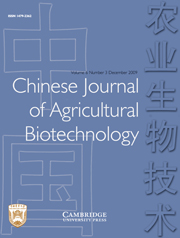No CrossRef data available.
Article contents
Cloning and sequence analysis of the leucine-rich repeats region of cereal cyst nematode resistance gene
Published online by Cambridge University Press: 20 March 2007
Abstract
According to the sequence of Rccn4, which is highly similar to the nucleotide-binding site (NBS) coding region of the cereal cyst nematode resistance gene, Cre3, three 3′ nested primers were designed to amplify its 3′ flanking region through single oligonucleotide nested polymerase chain reaction (SON-PCR). One 1264 bp band, Rccn-L, was amplified from E-10, a wheat–Aegilops variabilis translocation line containing the cereal cyst nematode resistance gene from Ae. variabilis. Sequence analysis showed that Rccn-L possesses the 3′ flanking sequence of Rccn4 and contains a 55 bp-sized consensus sequence with Rccn4. The coding region was 1026 bp, consisting of an incomplete open reading frame, a terminator codon and no initiation codon and intron; it encoded a peptide of 342 amino acid residues and shared 86% nucleotide sequence identity with Cre3. The peptide had a conserved leucine-rich repeat (LRR) domain, containing the imperfect repeats, XXLXXLXXL, comprising 17% leucine residues, and shares, respectively, 89% nucleotide sequence and 78% amino acid sequence identity with the LRR sequence of the Cre3 locus. In the present study, SON-PCR was used successfully, for the first time, in plant genome research and proved to be a valuable method in plant gene cloning. The acquirement of Rccn-L established the foundation for obtaining the complete Rccn gene and further structural and functional investigations.
Keywords
- Type
- Research Article
- Information
- Copyright
- China Agricultural University and Cambridge University Press 2006


